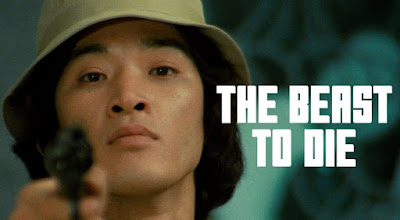 |
| Images courtesy of Radiance Films |
Not even a year after completing his The Game Trilogy in
1979 with actor Yūsaku Matsuda in the lead role, director Tōru Murakawa
reunited with his leading actor in what could be the acting-directing team’s
most searing and provocative offering yet with the dark and disturbing crime
drama The Beast to Die picked up by Radiance Films in a new 4K
restoration of the original camera negative.
To call it the stark antithesis of The Game Trilogy would be
underselling it and all of the intense places it goes over its brisk running
time. Something of a departure for actor
Matsuda from his cool stoic assassin of The Game Trilogy in favor of a
deranged sociopath, it marks a startlingly violent and brutal new change in
direction for the dynamic filmmaking duo and is a bold, uncompromising piece of
crime cinema that seems to go in through the bowels of Hell before desperately
feverishly searching for a way out into open air.
Shell-shocked and traumatized Vietnam War photojournalist
Kunihiko Date (Yūsaku Matsuda) seemingly reappears out of nowhere in nighttime
rainy Tokyo and begins enacting a random series of killings, taking out bystanders
and killing a wealthy businessman before stealing his home and identity. Lounging around in his swanky apartment
listening to jazz records and sipping on liquor, he starts bigger plans involving
a bank heist which leads him towards Tetsuo (Takeshi Kaga), an equally if not
more deranged sociopath who learns under Kunihiko’s teaching how to fire a
gun. On their tail is a private
detective named Kashiwagi (Hideo Murota) who seems unassuming but knows more
than he lets on. As they inch closer to
their impending heist goals, Kunihiko continues to grow more erratic and
deranged until neither we nor the audience are sure anymore of just what plane
of psychoses both of these men are journeying down.
Startling in its unflinching brutality including a vicious
bank heist with many deaths, a hasty shootout involving an unreliable gunman,
mounting madness and an increasing body count of innocent bystanders, The
Beast to Die like Graveyard of Honor before it is a thoroughly
searing study of postwar sociopathy.
Moving the story of the original text up from Haruhiko Oyabu’s novel
from Japanese wartime experiences to Vietnam and changing the finale to
something more nebulous and interpretive, the film presented a unique challenge
for leading actor Matsuda who reportedly lost over 10kg of body weight with
rumors of teeth being pulled to achieve the lanky look. With chilly desaturated teal blue hues lensed
by recurring Murakawa collaborator Seizô Sengen and jazzy overtones by Stray
Cat Rock: Machine Animal composer Akihiko Takashima, the look and feel of
the world of The Beast to Die seems intentionally dead inside
representing the bloodlessness of its chief antagonist.
Largely a showcase for the acting range of Yūsaku Matsuda
who all but has us hang on his every word, particularly in a standout sequence
where he tells the detective at gunpoint a story about Rip Van Winkle. As it goes on for minutes on end, we find
ourselves terrified and at a loss of how to properly process the end of a gun
barrel we’re staring down. Equally chilling
onscreen is his accomplice Tetsuo played by Death Note actor Takeshi Kaga,
sporting a perm and angry eyes whose fierce gaze still can’t match the
unbridled insane eyes emanating off of Matsuda.
Hideo Murota as the detective makes him omniscient and seemingly having
a handle on what Matsuda is doing, until he doesn’t. Special props also go to the cast of extras
being shot or physically and/or sexually assaulted by Tetsuo in what must’ve
been a difficult series of scenes to film.
Making its worldwide Blu-ray disc premiere via Radiance
Films, the special limited edition from Radiance comes with the usual OBI spine,
reversible sleeve art, collector’s booklet with new and archival essays and
interviews with the director and screenwriter, The Beast to Die is a
most bumpy, threatening, challenging ride that deviates from the text somewhat while
also providing actor Matsuda with an opportunity to springboard into uncharted
territory. Those familiar with The
Game Trilogy as well as those uninitiated are in for something of a cruel
surprise here in a movie that deliberately goes off the rails and pushes the
audience into increasingly uncomfortable territory. Matsuda is almost operatic onscreen here with
how he moves like a feral animal to his infamous closing speech where he seems
to relive his wartime photographic days.
Not everyone will take to this maddening clenched fist of a film but for
world cinema enthusiasts and those keen on the work of Yūsaku Matsuda, it is
kind of a boldly dark gift that keeps on giving.
--Andrew Kotwicki





